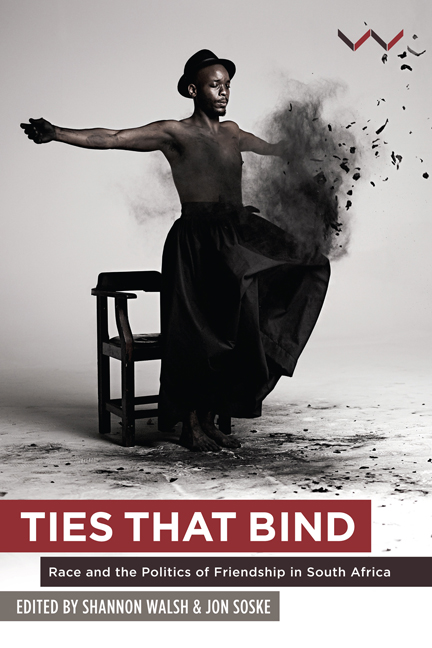Book contents
- Frontmatter
- Contents
- List of Figures
- Epigraph
- Fanon's Secret
- 1 Thinking About Race and Friendship in South Africa
- 2 With Friends Like These: The Politics of Friendship in Post-Apartheid South Africa
- 3 Bound to Violence: Scratching Beginnings and Endings with Lesego Rampolokeng
- 4 Afro-Pessimism and Friendship in South Africa: An Interview with Frank B. Wilderson III
- 5 The Impossible Handshake: The Fault Lines of Friendship in Colonial Natal, 1850-1910
- 6 The Problem With ‘we’: Affiliation, political Economy, and the Counterhistory of Nonracialism
- 7 Affect and the state: Precarious Workers, The Law, and the Promise of Friendship
- 8 ‘A Song of Seeing’: Art and friendship Under Apartheid
- 9 ‘Friend of the Family’: Maids, Madams, and Domestic Cartographies of Power in South African Art
- 10 Corner Loving: Ways of Speaking about Love
- 11 Kutamba Naye: In Search of Anti-Racist and Queer Solidarities
- 12 The Native Informant Speaks Back to The Offer of Friendship in White Academia
- Acknowledgments
- Contributor Biographies
- Index
2 - With Friends Like These: The Politics of Friendship in Post-Apartheid South Africa
Published online by Cambridge University Press: 21 April 2018
- Frontmatter
- Contents
- List of Figures
- Epigraph
- Fanon's Secret
- 1 Thinking About Race and Friendship in South Africa
- 2 With Friends Like These: The Politics of Friendship in Post-Apartheid South Africa
- 3 Bound to Violence: Scratching Beginnings and Endings with Lesego Rampolokeng
- 4 Afro-Pessimism and Friendship in South Africa: An Interview with Frank B. Wilderson III
- 5 The Impossible Handshake: The Fault Lines of Friendship in Colonial Natal, 1850-1910
- 6 The Problem With ‘we’: Affiliation, political Economy, and the Counterhistory of Nonracialism
- 7 Affect and the state: Precarious Workers, The Law, and the Promise of Friendship
- 8 ‘A Song of Seeing’: Art and friendship Under Apartheid
- 9 ‘Friend of the Family’: Maids, Madams, and Domestic Cartographies of Power in South African Art
- 10 Corner Loving: Ways of Speaking about Love
- 11 Kutamba Naye: In Search of Anti-Racist and Queer Solidarities
- 12 The Native Informant Speaks Back to The Offer of Friendship in White Academia
- Acknowledgments
- Contributor Biographies
- Index
Summary
This research took the form of many late nights grappling with texts, everything from social network theory to studies on urban space and planning to philosophy. What it produced is fairly unique, part of a growing genre known as documentary theatre. I have taken verbatim the words of people such as Sindiwe Magona, Njabulo Ndebele, Dennis Brutus, Zama Ndlovu, Sekoatlane Phamodi, and many other South Africans who are thinking publically about the problems South Africa faces and the dreams we must embrace, and I have asked Lebo Mashile, one of our country's most important contemporary poets, to perform them in order to make them visual.
I chose this methodology because I wanted us to remember that we have already written many, many important things about race and justice and humanity in this country. I also chose the documentary theatre genre because here in South Africa fact is often stranger and more poignant than fiction. In this context, performing real words on a stage forces us to confront their importance and it moves us beyond business as usual.
Lastly, I chose this genre because I wanted to signal that there is a new generation of contemporary thinkers: people such as Milisuthando Bongela, Danielle Bowler, T. O. Molefe, and others who are cited here, whose words are as much a window into this country's collective soul as those of Gordimer or Coetzee or Paton.
Now that the season of realpolitik is upon us and the rainbow myth is receding we must ask ourselves whether we still need a framework of reconciliation that presupposes friendship across the races as an important and useful barometer of the health of the nation.
Some will argue that the question of friendship is frivolous. They will say we must be more concerned with matters of politics and economics than of emotion, and that we don't need to be friends; we simply need not to interfere with one another's destinies. Others will insist that we must indeed be friends. They will wring their hands and argue that to abandon the idea of friendship is to abandon an important national ideal and perhaps to abandon a peaceful future.
- Type
- Chapter
- Information
- Ties that BindRace and the Politics of Friendship in South Africa, pp. 31 - 47Publisher: Wits University PressPrint publication year: 2016

